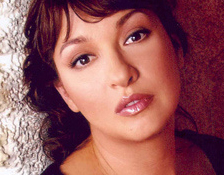Remembering Elizabeth Peña: Greater Than the Sum of Her Roles
 While there are many fine actors who possess that certain je ne sais quoi none compare to Elizabeth Peña. She was so much larger than the sum of her roles. Her body of work is incomparable. On October 14, 2014, Hollywood lost an acting gem and not sure we’ll ever see another woman embody her skill of craft.
While there are many fine actors who possess that certain je ne sais quoi none compare to Elizabeth Peña. She was so much larger than the sum of her roles. Her body of work is incomparable. On October 14, 2014, Hollywood lost an acting gem and not sure we’ll ever see another woman embody her skill of craft.
She has been eulogized for her exceptional career—La Bamba, Lone Star, Jacob’s Ladder, Down & Out In Beverly Hills, and many other films. Her TV roles equal in importance and throughout the years she has been in dozens of prominent TV series, including just wrapping seven episodes of Rey Network’s Matador. More recently she was Sofia Vergara’s mother on ABC’s Modern Family, and once starred in her own ABC sitcom I Married Dora.
However, those who knew the Cuban-American actress best, know the one role she most cherished was that of Beatrice “Bibi” Corrales, the strong-willed, sassy, opinionated, flashy woman in Show-time’s Resurrection Blvd. (2000-2002). It was a favorite and mostly under-appreciated role she ever played. As Bibi, Peña brought her to life with such humanistic depth that had nothing to do with race or economic class. She made Bibi relatable and unforgettable.
When Resurrection Blvd. executive producer and show creator, Dennis Leoni was casting the role of Bibi, he got word that Elizabeth wanted the part. “She was perfect, right age, a perfect fit,” said Leoni. “I loved her as an actress and thought she was tremendously talented and when she said she wanted it, that was it, it was hers.” Leoni went on to say that Elizabeth was proud to be part of the first ever drama series to have actual Latino producers, Latino writers, and acted by Latinos.
Tony Plana recalled he met Elizabeth when she first came out to Los Angeles from New York City. Their meeting was a 6-degrees from separation type of connection. “Her first film in 1979 was El Super, and my cousin was friends with the filmmaker,” he said.
When Elizabeth decided to move to L.A., his cousin asked him to show her around. “She didn’t have a car so I chauffeured her everywhere,” he chuckled. “I took her to see a play with Richard Dreyfus at the Doolittle Theatre [now Ricardo Montalban]. I had been working with Richard on a couple of project readings so I got to go backstage and Elizabeth and Richard met. They had chemistry and not much later, she got cast in Down & Out in Beverly Hills. This was her first forage into Los Angeles and her first really big hit commercial movie.”
Elizabeth’s breakout role in the 1987 Luis Valdez hit La Bamba not only put her on the path for stardom but it also paired her with Esai Morales. The chemistry between Elizabeth and Esai was electrifying so much so that when Leoni wrote the role of Bibi’s ex-husband Paco Corrales, there was no one else he wanted than Morales. “Their on-screen chemistry was magic,” he said.
In a separate interview to a network news outlet, Morales talked about Peña’s invaluable contribution. “When one talks about a third dimension, there was a third ‘d’ when it came to Elizabeth, and that was dignity,” he stated.
As an actress working against the stereotypes, Morales got emotional. “Elizabeth showed you don’t have to sell yourself short and you don’t have to sell yourself,” he said.
“She wasn’t in it for the fame or money, she was in it for the arts,” said Plana. “She loved acting and enjoyed immersing herself in the role and she didn’t really talk about the process, which was intense and deep. She simply detailed the narrative. To see her come alive and all reflected in this physical integration—a whole human being performing in all her dimensions and it was extremely stimulating. She brought out the best in the rest of us.”
There will never be another Elizabeth Peña but the legacy she leaves will help the next generation of Latinos excel in Hollywood without ever comprising the integrity of their craft or cultural essence.





